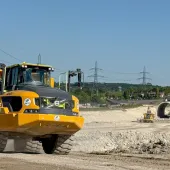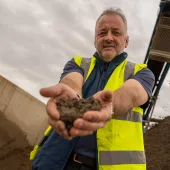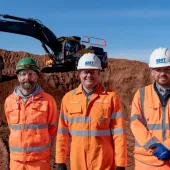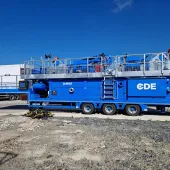Khoury Contracting Company turn to Volvo equipment

KCC using Volvo excavators, loaders and articulated haulers to help construct new landfill site in Lebanon
A FLEET of Volvo machines is busy removing an existing waste dump and helping to construct a new sanitary landfill in the coastal town of Bourji Hammoud, Lebanon.
Located north east of Beirut on the edge of the Mediterranean, Bourj Hammoud is home to 150,000 residents within 2.5 sq km (one mile), making it one of the most densely populated districts in the Middle East. The town is also home to a 47m (154ft) ‘rubbish mountain’ that has lain dormant in the local landfill for 27 years.
In 2016, the Lebanese government announced the reopening of the Bourj Hammoud Landfill and a tender was put out that required the winner to remove the mountain of rubbish and replace it with a new, sanitary landfill. When fully completed in August 2020, the multi-million-dollar development is expected to contain 1.6 million tonnes of waste.
Working for the Council for Development and Reconstruction (CDR) are Khoury Contracting Company (KCC), specialists in marine, municipal work and heavy civil engineering. Established in 1987, KCC’s work portfolio consists of several high-profile projects, including the construction of the Boqaata dam in Lebanon, which acts as Mount Lebanon’s largest water source containing 7 million cubic metres (1.8 billion gal) of water.
‘Our history of working on large projects provides us with the experience and confidence to complete the Bourj Hammoud Landfill,’ said Toufic Kazmouz, project manager for KCC. ‘We have the right team and equipment – both of which are essential to ensure the success of the project.’
Indeed, having the right equipment is necessary for a project that has already proven challenging. For example, the existing landfill lacked access roads, so the company constructed three roads (each one is 1km in length). More than 200 KCC employees are currently working at the landfill site, alongside 39 machines from Volvo CE, including: EC460B, EC380D, EC350D, EC360B and EC290B excavators; A35C, A35D A40 and A40D articulated haulers; L180E and L220E wheel loaders; and SD110 soil compactors.
Working to complete phase one of the project are the Volvo excavators and articulated haulers, thought to be excavating 3.5 million cubic meters of waste from the existing site. The waste extracted by Volvo excavators from the dump will be sorted, hauled and backfilled in a reclaimed area of 340,000 square metres using Volvo dumptrucks.
Some of the excavators used during the initial phase will subsequently be used to build a breakwater wall designed to create a strong shield from the waves. Around a million cubic metres of rock fill material will be used for its construction, as well as 200,000 cubic metres of concrete for the face of the breakwater.
The new sanitary landfill consists of eight cells, each constructed by the wheel loaders. The Volvo excavators and articulated haulers will lay two million square metres of liner system – a geomembrane isolating material – that will contain the solid waste transported from existing treatment centres in Beirut.









